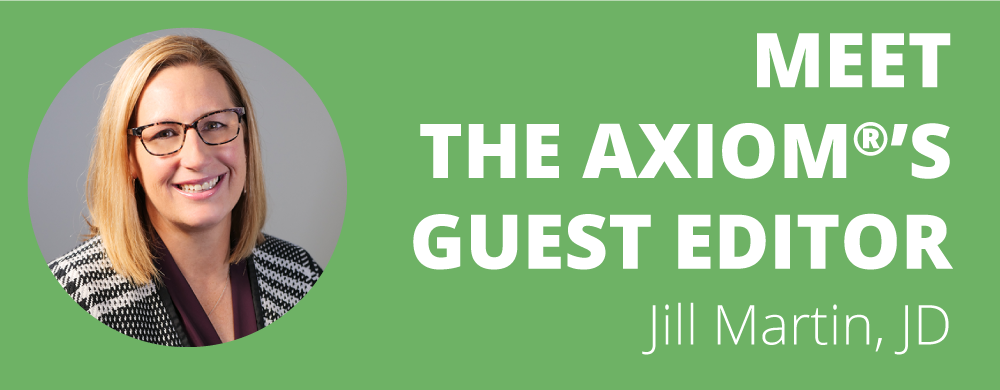
Axiom | Vol 243
FEATURED: Meet The Axiom’s Guest Editor: Jill Martin | Inside: Markets Overcome Correction Fears – This Time | Poll Recap: Are You Using Grocery Delivery Services More Than You Did A Year Ago? | MoneyDo: Understand & Prepare For Long Term Care | Ask Annex: I’m Thinking About Moving To A Different State…Do I Need To Live There For A Certain Amount Of Time To Receive Tax Benefits? | DYADT: Does Your Advisor Help You Identify Potential Pitfalls When Rolling Over Your 401(k) Funds? | A Shocking Vaccine Stat | $140 Billion In Heartbreak | What’s That? What’s Forbearance

I’m Jill Martin, Annex Wealth Management’s Estate Planning Attorney.
My goal is to make estate planning concepts easy to understand through education and examples for both our clients and employees. Everyone needs an estate plan, regardless of their level of wealth and at Annex we are here to get you headed in the right direction. I truly enjoy coming to work every day as no day is ever the same, every client has a unique story that requires personalized planning, and it’s a pleasure to get to know and work with all of them.
My husband, Shane, and I met on Match.com while I was in law school (yes, we really did!!). Since I’m originally from just outside of Madison, we decided to settle down in Wisconsin. We both have a great love of softball and while my playing days are over, I continue to be a part of the game as an assistant coach at Waukesha West. In addition to softball, we rescue and foster Great Danes and I recently started my trek to hike the Ice Age Trail with 4 wonderful friends.

The Markets shook off negative whispers of a correction and finished slightly higher, buoyed by stellar retail sales news. With more stimulus on the way, can the markets continue to defy a correction? Annex Wealth Management’s Dave Spano and Todd Voit discuss.
Markets Overcome Correction Fears – This Time

Recap: Are You Using Grocery Delivery Services More Than You Did A Year Ago?
We have a unique outlook with this week’s poll – we were able to compare reader response to the same question asked in a poll last year.
Our latest poll shows that the majority of respondents have not changed their shopping preference from last year: they still enjoy in-person shopping. This year, over 72% of respondents said they prefer to do all their grocery shopping in-person and choose to skip grocery delivery services. A smaller group, 20% of respondents, said they do the majority of their grocery shopping online and shop in-person only sometimes.
Compared to our poll from last year, the majority has not changed their shopping preferences. Last year, over 78% of respondents indicated they prefer to shop in-person.
Grocery shopping has evolved over the last year and US shoppers are finding new ways to stock up. A year ago, around 81% of consumers had never bought groceries online, but during the COVID-19 pandemic 79% of shoppers have ordered online. Online grocery sales totaled $1.2 billion last year, with the total increasing to $7.2 billion last June. The variety of online grocery delivery services has also evolved with more options and companies to choose from than ever.
Despite the introduction of new grocery delivery services, in-person grocery shopping still dominates the supermarket industry. According to a recent study, around 60% of Americans still do most of their shopping in-person, despite accessibility, convenience, and overall growth of grocery delivery services. Consumers have reported that some online delivery services are unreliable, and products are frequently out of stock, not fresh, or too expensive.

Understand & Prepare For Long Term Care
This week’s MoneyDo is to consider the potential costs of long term care, and whether you need to consider long term care as a part of your financial plan.
Before you assume that you won’t need long term care, consider what it is and if it’s covered by your current insurance picture. Long term care becomes necessary when we can no longer perform activities of daily living by ourselves like bathing, getting dressed or eating. The care provided is not rehabilitative in nature therefore, health insurance or Medicare will not cover it. We encounter many folks who don’t realize or consider this lack of coverage.
Without special insurance to cover long term care needs, long term care will be funded “out of pocket”. The question you should ask yourself is “Do I have enough assets to pay for long-term care, or is long term care insurance necessary?”
We believe there are three primary concepts to consider when weighing long term care insurance: the financial ability to pay for long term care, spousal impoverishment, and the impact long term care has on legacy goals. Consider this example:
- Bob is single and lives on pension income, Social Security and $800,000 of investments.· He is not concerned if he leaves a legacy after his death.
- After a little research Bob estimates long term care can be as much as $115,000 per year.
- After a complete analysis which considers his annual spending and other retirement goals, he determines he can afford at least 3 years of long term care in the future.
- He decides to fund any possible long-term care expenses from his income and investments.
- He makes the decision to not purchase a long-term care policy.
Bob’s mindset may change if he’s married or has kids. At once, the long-term care decision has become more complex, since asset depletion could impact more than just Bob. His span of concern would include his wife, who could become impoverished, or that he’d be leaving his kids very little as a legacy.
As a husband and a parent, Bob may determine a long-term care policy would cover a significant portion of his long-term care, thus leaving assets to his wife to maintain her lifestyle and a possible legacy to their children.
Make sure you realize how long you’ll have to pay long term care premiums. Unless you reasonably expect to work until you pass away or become incapacitated, you’ll have to keep paying long term care insurance premiums throughout your retirement to keep the insurance in force.
In other words, you’ll need enough spare income in your retirement to pay the premiums, which would require a decent asset base, a reliable income stream, and perhaps a lower cost of living.
So, whether you’re retired, or “only” in your fifties or sixties, think hard on this Moneydo. We suggest reviewing your financial plan, and making sure your goals will remain intact if there is a need to cover long term care expenses in the future.

This week’s Ask Annex comes from Robert, who asks:
“I’m thinking about moving to a different state when I retire. Is it true that I need to live there a certain number of days in order to receive tax benefits from that state?”
____________________
This week’s Ask Annex response was prepared by our Director of Client Learning & Development, Deanne Phillips, CFP®, CDFA®:
If you are considering a move for tax reasons, keep in mind that “moving” is different than changing domicile —which is the location of a your principal, permanent home.
Your tax benefits – including no state income tax in some states – usually follow your declared domicile. Some states do have criteria driven statutes that help to determine your domicile – such as how many days in the year you stay there.
But there is much more to proving where your main, permanent home is. These proofs can include where your driver’s license and voting registration are, where your doctors or other professionals reside, to where your important household possessions are. Remember you can have many residences, but declare only one domicile.
Looking for a deeper dive? Read our whitepaper:

Many financial professionals work hard on a sale, and less hard to maintain a meaningful relationship with you. Not Annex.
Does your advisor help you identify potential pitfalls when rolling over your 401(k) funds?


KNOW THE DIFFERENCE MINUTE:
A Shocking Vaccine Stat
KNOW THE DIFFERENCE MINUTE:
$140 Billion In Heartbreak
WHAT’S THAT?

The Axiom is such a great source of information. There is something for everyone each week, whether its learning something new or expanding on a concept to really help you along the comprehensive wealth management path. While it would be easy to say the MoneyDo is my favorite section since I’m a frequent author, I really believe our events are second to none as a great way to further your education about all the different aspect of your financial plan.
– Guest Editor, Jill Martin, JD
Estate Planning Attorney
__________________________
Annex Wealth Management provides free workshops, open to the public, on key wealth management topics.
Each week, we provide links to register for upcoming events.
